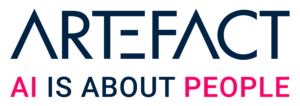In today’s dynamic and ever-evolving tech industry, a career track can often feel like a winding path through a dense forest of opportunities. With rapid advancements in technology, the possibilities are endless, but so are the challenges.
We also have to bear in mind that Artefact is a consulting firm and not a product company. Our focus is the implementation of AI and data-powered solutions, so tech is at the heart of what we do on a daily basis, but not in the same way as it is at companies like Facebook or Google.
In the following article, we wanted to present to the community our attempt at solving the problem of building a career system that both reflects the day-to-day work of our engineers and stands the test of time in an ever-evolving technological landscape. It was introduced 3 years ago and has been a solid foundation for the team ever since.
Simplicity is the ultimate sophistication
Our evolution system takes the form of a ladder we got the inspiration to design from the most successful tech companies. We have 13 steps ranging from interns to directors. Throughout the years we have worked out exactly what we expect from each role… at least up to lead engineers.
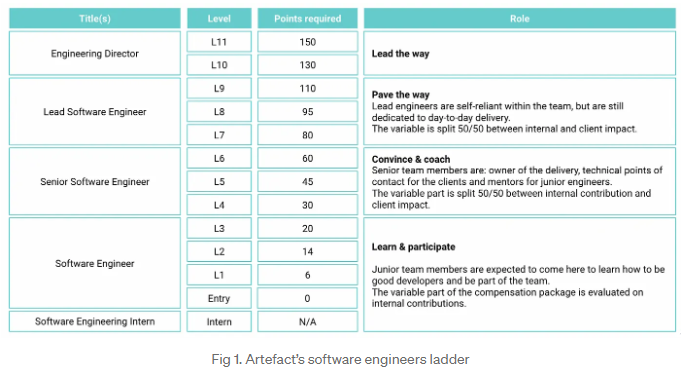
Our system is based on as few principles as possible, giving it a by-design robustness that makes it impossible to tamper with. Here are the key principles of this system:
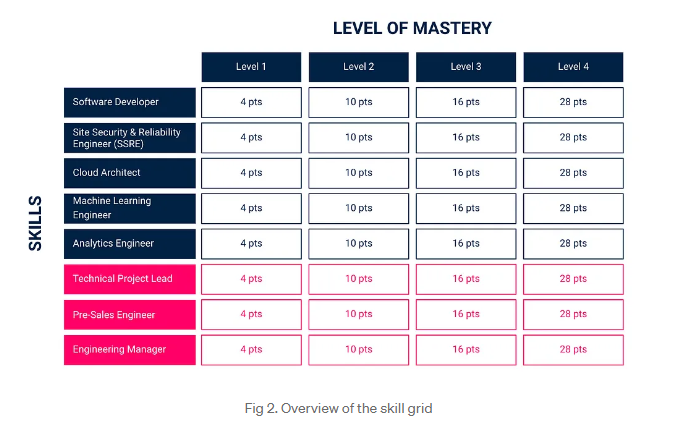
This system fits us well as a tech team in a consulting firm that builds a lot of varied software because it rewards both versatility and specialization. Two people can have the same level with either a great spike in a given technical skill or good abilities in a lot of different skills, which is an asset for our very diverse portfolio of clients and projects.
Today we are proud to say that this system helps us evaluate 100% of the day-to-day work of everyone on the team.
Skills that reflect our day-to-day work
The skills we evaluate team members on are phrased as roles, because at Artefact, being a software engineer means taking on a lot of different responsibilities depending on the projects we are staffed on. We split them into expertise (technically-based) and growth (people-based) roles.
Expertise
Software Developer: You write code for your clients, to build anything from applications to data pipelines, but you rarely build front-ends.
Site Security & Reliability Engineer: You take care of the deployment, operation, and security of the software you ship for your clients.
Cloud Architect: You design your own data and IT architectures and guide your client on this topic.
Machine Learning Engineer: You help data scientists ship models faster and with more confidence thanks to MLOps and LLMOps tools and processes.
Analytics Engineer: You build your data pipelines in all directions, from exploratory analysis to production pipelines, from documentation to data quality monitoring.
Growth
Technical Project Lead: You lead teams of technical people, sometimes cross-expertise, with tools like lean management and agile methodologies.
Pre-Sales Engineer: You help partners and directors sell more interesting, cutting-edge, and better-sized projects.
Engineering Manager: You make the team grow, coach engineers and help us build the best team possible.
Fair and future-proof
The heart of the career system is its skill grid and how it is written. We were immensely careful when specifying the criteria for each level of each skill, making the 32 items very precise.
For each of these levels, we provide 4 criteria to help team members evaluate their skills and the skills of their peers: definition, reach, examples, and experience (see Fig. 3 for a concrete example).
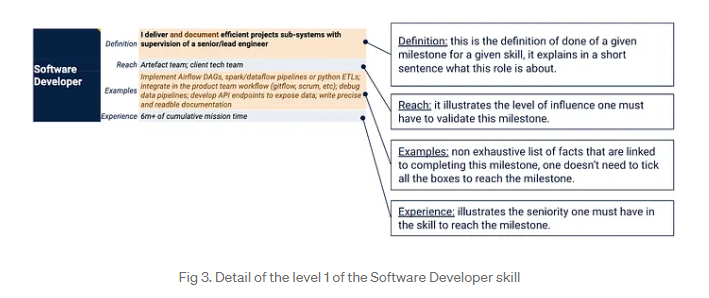
Moreover, technology is evolving fast and the market tends to follow this rapid evolution, making very specific tools-oriented checklists irrelevant for skills assessment. Or maybe you like changing evaluation criteria every six months and that’s ok as well. That is why we have very broad definitions. In addition to these definitions, we redacted a non-exhaustive list of examples to give a feeling of the daily activities of a team member.
Conclusion
We are proud of this system that shows our core values: hard work, genuine interest in the craft, and fairness. We reward people and make them move up the ladder according to the skills they develop and the aura they build around them.
We believe that a fair evaluation process and a fixed grid of salaries is the best way to ensure wage equality for a given quality of work, and this system is here to stay.
If you see yourself working in our team and developing those skills, feel free to check our Medium article explaining how we hire and apply to our job positions.

 BLOG
BLOG


